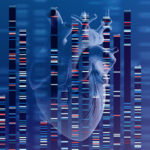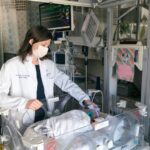With support for genetic condition trisomy 18, Brooklyn ‘tells her own story’
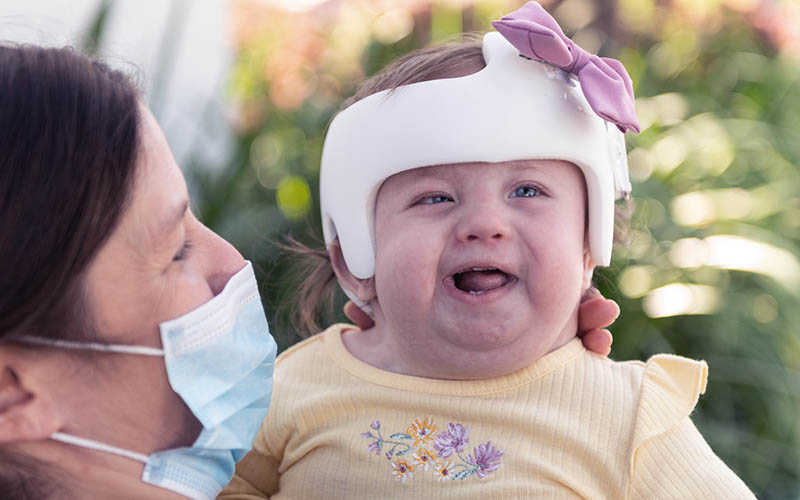
Erin and Tim Haggan quickly realized they would always be seeking answers after learning the child they were expecting had trisomy 18.
It is a life-threatening chromosomal condition, and only about 10 percent of children live beyond their first year. Those who survive grow slowly and often have congenital heart defects (CHD) and other organ anomalies. The couple recognized there would be a lot of information to consider; a lot of critical decisions to be made.
That’s why they have come to appreciate the advice and direction offered by Boston Children’s Cardiovascular Genetics Center since their daughter, Brooklyn, was born. Now 17 months, Brooklyn smiles constantly and finds delight in banging the keys of a toy piano. These are happy times, but to get there, Erin and Tim had to first turn to cardiologists, cardiovascular geneticists, pulmonologists, cardiac surgeons, sleep specialists, and other clinicians to help Brooklyn overcome several physical hurdles.
“They knew with the right care, Brooklyn would take the lead herself and tell us her own story,” says Erin.
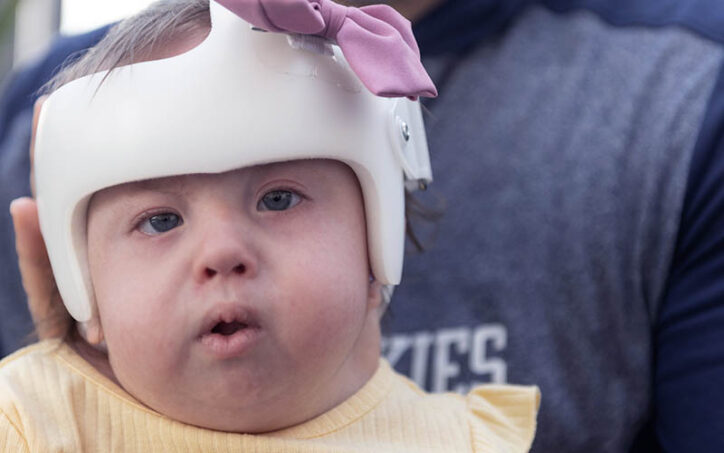
Facing a lifetime of difficult decisions
Also known as Edwards syndrome, trisomy 18 occurs when a random genetic event during reproduction includes three copies of chromosome 18 instead of the usual two. Before Brooklyn’s birth, the couple had met with geneticists near their Connecticut home to learn more about trisomy 18. But after she was born, and with the support of their local hospital, Erin and Tim looked elsewhere for more insight about genetics because it would inform the many decisions they’d have to make about their daughter’s care in the years ahead.
They also sought a second opinion when local doctors were reluctant to repair Brooklyn’s ventricular septal defect (VSD) — a hole in the wall that separates the lower right and left chambers of the heart — a few months after her birth. The surgeons were concerned about the risk of Brooklyn developing complications, the Haggans say, because of the complexities of trisomy 18. Wanting Brooklyn to receive the same medical treatment “as any other kid,” the couple made an appointment at Boston Children’s.
Finding comprehensive care and answers
Erin and Tim immediately appreciated how the Cardiovascular Genetics Center, which is part of the Benderson Family Heart Center, coordinates the care of children with cardiac and genetic conditions. The family first met with cardiologist Dr. Daniel Quiat, who wanted to treat Brooklyn’s VSD quickly, particularly because trisomy 18 patients are at higher risk of developing pulmonary hypertension. He also arranged for the family to meet Dr. Amy Roberts, co-director of the Cardiovascular Genetics Center, during their visit.
It was apparent to Erin and Tim that Drs. Roberts and Quiat understood the complete spectrum of trisomy 18 and would be able to properly assess the complications Brooklyn could experience. For example, Dr. Roberts has given the couple “head-to-toe” lists of tests Brooklyn would and wouldn’t need over time. One “must-have” test is a frequent screening for Wilms tumor, a rare kidney cancer. But she advised against testing Brooklyn a second time to determine where she is on the trisomy 18 spectrum because the results wouldn’t have changed her care.
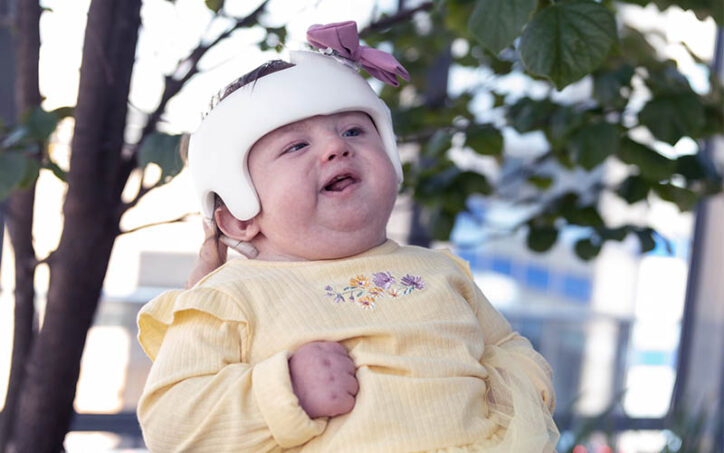
“It came down to, ‘Would the test change anything?’” explains Erin. “She saved Brooklyn from another procedure and I liked that she was upfront with us about that.”
Seeing the best in Brooklyn
Dr. Christopher Baird, a cardiac surgeon at the Benderson Family Heart Center, repaired Brooklyn’s VSD in one procedure. Still, her breathing didn’t improve back home, and she made several trips to her local hospital. Once, as Brooklyn struggled for air, Erin called Dr. Quiat for help. He worked with Brooklyn’s local cardiologist to have her quickly evaluated at the emergency room.
It was those gestures and Drs. Quiat and Roberts’ familiarity with Brooklyn that prompted Erin and Tim to bring her back to Boston Children’s to address the ongoing pulmonary and gastrointestinal issues that were landing her in the local hospital almost weekly. Boston Children’s Sleep Center got to the bottom of her breathing issues, diagnosing and treating her for obstructive sleep apnea. Tested again this spring, Brooklyn now has only mild sleep apnea and no longer needs a machine to keep her airways open at night.
Going at her own pace, Brooklyn displays a new skill almost every day. She recently started putting together vowels and consonants, and she discovered her feet. Brooklyn also now opens and shuts her hands following the cues of a song. For that matter, she loves music, including the song “Wheels on the Bus.” And when she meets someone new, she flashes a look that says, “Who are you?” — but she quickly adjusts. Throughout it all, Brooklyn continues to melt her parents’ hearts with her constant smile. “She smiles so big,” Erin says.
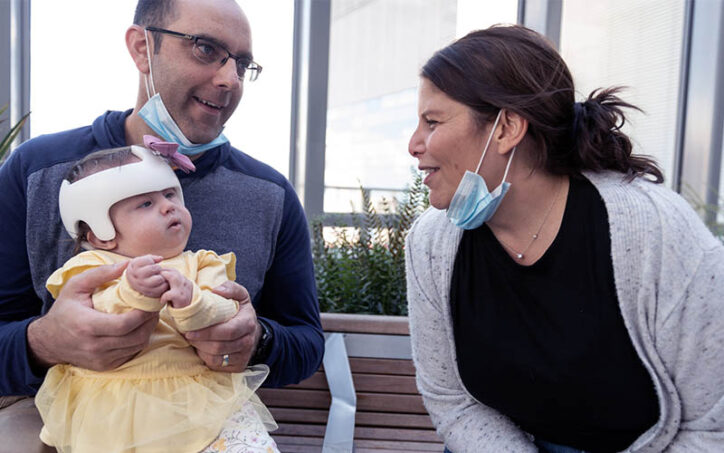
Brooklyn still comes to Boston Children’s for treatment, most recently to see specialists at the Aerodigestive Center for digestive and respiratory care. Erin and Tim appreciate how at Boston Children’s, they have been able to access comprehensive multidisciplinary care that’s not easily found elsewhere, and they couldn’t imagine navigating the many steps behind that treatment without Drs. Roberts and Quiat, who always reply to their emails with answers that best support Brooklyn.
“They saw the best in her,” Erin says. “They have been supportive of her and of our level of commitment to her.”
Learn more about the Cardiovascular Genetics Center or schedule an appointment.
Related Posts :
-

Coordinated care and research for genetic cardiovascular disorders
Genetic cardiovascular disease in children sometimes comes to light in a crisis — a sudden collapse, sudden breathing difficulty, a sudden ...
-

Using genetics to glimpse newborns' future with congenital heart disease
Aside from infections, congenital heart disease (CHD) is the leading cause of infant mortality. Informed by babies she sees in ...
-

Six ways to keep kids with aerodigestive disorders healthy
There’s probably not an adult or child who hasn’t experienced the stuffy nose and difficulty swallowing associated with ...
-

From South Africa to Boston: Kyleigh's four-year search for good heart health
Kyleigh Kista had three open-heart surgeries in just the first 18 months of her life. But instead of progressing, her ...


